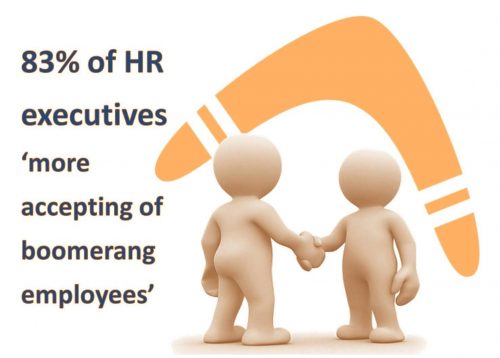New research suggests 83 percent of HR executives in the UK are more receptive to the idea of hiring boomerang employees than they were 3 years ago, with only 7 percent saying they were against the idea.
Recruitment specialists Robert Half UK say their survey shows more UK firms are welcoming back boomerang employees – workers who leave, for whatever reason, and then return to the former employer at a later date.
It appears that ongoing skill shortages could be encouraging HR directors to look at boomerang employees – especially if they develop and broaden their experience in other organizations and can be brought back into the company at higher levels.
Senior Managing Director Phil Sheridan says, “the growing acceptance of boomerang employees emphasizes the increasing fluidity of the job market, ” and adds:
“Many firms see value and potential cost savings in allowing employees to expand their experience and skills set outside their organization, leaving the door open for them to return at a later date.”
 New research suggests more UK firms are embracing the idea of hiring boomerang employees – especially if they increase their skills and perform well while with other employers.
New research suggests more UK firms are embracing the idea of hiring boomerang employees – especially if they increase their skills and perform well while with other employers.
The survey is carried out annually by an independent research firm who interview over 200 senior HR executives in firms across the UK.
Over a third (36 percent) of the respondents said they have successfully rehired a boomerang employee, while only a quarter (25 percent) said they had done it but would not do it again.
Smaller firms less keen, could be missing opportunity
The research finds half (49 percent) of HR executives in large companies have successfully hired boomerang employees, and that larger companies are less likely to reject the idea (7 percent against rehiring) than smaller companies (12 percent against).
This result suggests smaller companies could be missing an opportunity. Often, in smaller enterprises, there is limited scope for learning new skills. Allowing employees to leave and gain new skills elsewhere, then bring them back in when a suitable role is available could benefit the smaller firm.
When asked which factors most influence the success of rehiring boomerang employees, 60 percent of HR directors said a successful track record. The next most influential factor was fit with the company culture (40 percent mentioned this).
Plus, over a third (36 percent) of HR executives said the reduced costs of bringing them on board also influenced their decision to hire boomerang employees.
Boomerang employees are like alumni
It appears that the UK is not the only place where employers are coming round to the idea that hiring boomerang employees might be good for business.
Last year, Kronos, the U.S.-based, multinational workforce management software and services company reported results of a national survey they co-commissioned that suggests mindsets are changing in the U.S. as well.
The survey found 76 percent of American HR professionals said they are more accepting of hiring boomerang employees than they were in the past, despite nearly half claiming their organizations had previously had a policy of not hiring former employees.
The emerging theme is that former employees are like alumni, and ties with them – especially between top performing alumni and firms with a strong corporate culture – should not end just because the working relationship is over.
However, this new era of the boomerang employee creates fresh challenges for job seekers and organizations. They both have to find ways to nurture their alumni relationships – as the effort they invest in them may well prove to be mutually beneficial in the future.
